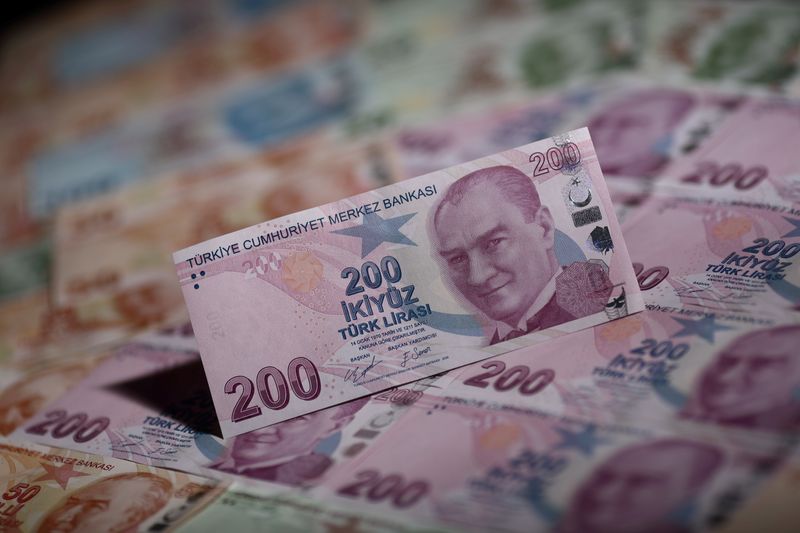By Marc Jones
LONDON (Reuters) - A big fall in Turkey's lira is hardly rare these days, but the currency's precipitous 20% plunge over the last week is ramping up risks of a balance of payments crisis unless authorities can somehow pull the brake.
The lira fell 15% at one point on Tuesday alone, ending the day with its largest daily drop since its tumultuous 2018 crisis, and analysts are worried the declines could rumble on.
The crux is that the country's central bank is bowing to political pressure from President Tayyip Erdogan to deliver interest rate cuts despite 20% inflation that could reach 30% or even 50%, economists say, if the lira can't recover.
Years of failed FX interventions mean currency reserves are now around $30 billion in deficit once central bank FX swap deals are accounted for, compared to positive $30 billion in 2018. Things could worsen if Turks themselves start pulling money out again.
"The options on the table are limited," Societe Generale (OTC:SCGLY)'s Phoenix Kalen said on how the current lira rout could be stopped. "In light of depleted FX reserves: capital controls or a series of emergency rate hikes."
Erdogan has doubled down on his opposition to high interest rates saying he rejects policies that would "condemn our people to unemployment, hunger and poverty", but most veteran Turkey watchers think rate hikes will have to come.
Goldman Sachs (NYSE:GS) expects the current 15% rates will go back up to 20% before mid next year, pointing out that traditional economic models and rules show 26% rates are needed to bring inflation back to the central bank's 5% target.
"Considering that elections are only 18 months away, we think that such an option is unlikely," Goldman's analysts acknowledged.
Some though, including Ahmet Davutoglu, a former prime minister who served alongside Erdogan, warn the lira slump risks a balance of payments crisis - when a country no longer has the money or the ability to borrow it to pay for essentials.
Credit rating agency S&P Global (NYSE:SPGI) last month estimated that over the next 12 months close to $170 billion of mainly dollar-denominated foreign currency debt needs to be refinanced - the equivalent to 23% of GDP and far more than reserves could cover.
If the lira slump makes that task difficult or in some cases impossible, woes could quickly spiral.
Turkey has hit such difficulties in the past -- it needed an IMF rescue in 1999 -- and Davutoglu says because so much of Turkey's debt is in dollars, 3 trillion lira ($236 billion) has been added to the country's debt by this crisis.
"The picture we face now will bring with it a balance of payments crisis similar to that of the 1970s," he said on Tuesday.
Erdogan said this week that Turkey's banking sector and budget are strong, adding the government does not have immediate financing needs for investments.
"We know very well what we are doing with this policy, why we are doing it, which risks we face and what we will obtain at the end," Erdogan said.
RISING COSTS
Others also think a BoP crisis isn't on the cards just yet.
The Institute of International Finance estimates this year's current account deficit stands at $15 billion, or 2.1% of GDP, compared to $22 billion, or 2.8%, back in 2018.
UBS' head of EM Strategy Manik Narain thinks the main reason is because with a debt ratio of less than 40% of its annual GDP, Turkey can still afford bail-outs of banks and big firms if need be.
But Bank for International Settlements data shows the damage the near 90% fall in the lira over the last decade has inflicted.
Back in 2011 the private sector spent 7.4% of revenues on paying interest on loans. At the end of Q1 this year it was 19.6%, and that was before the lira slumped another 30%. Just over 55% of Turkish bank deposits are also now in dollars, Turkish central bank data also shows.
Narain cautions market confidence is fickle though. If things look okay a country can easily finance a 3-4% deficit, but if capital is fleeing it can be difficult and costly.
"It's the same old issue we have been seeing for a decade," he said. "We need the central bank pushing back and giving the market some orthodox policy and a credible commitment to positive real rates," referring to interest rates once the inflation is accounted for.
William Blair fund manager Yvette Babb also shuns the idea of an imminent BoP crisis, saying the lira's slump will further reduce imports and though rising energy costs will weigh, exporters and tourism should benefit.
"Critical will be Turkey's ability to continue to roll over its external debt," she said.
